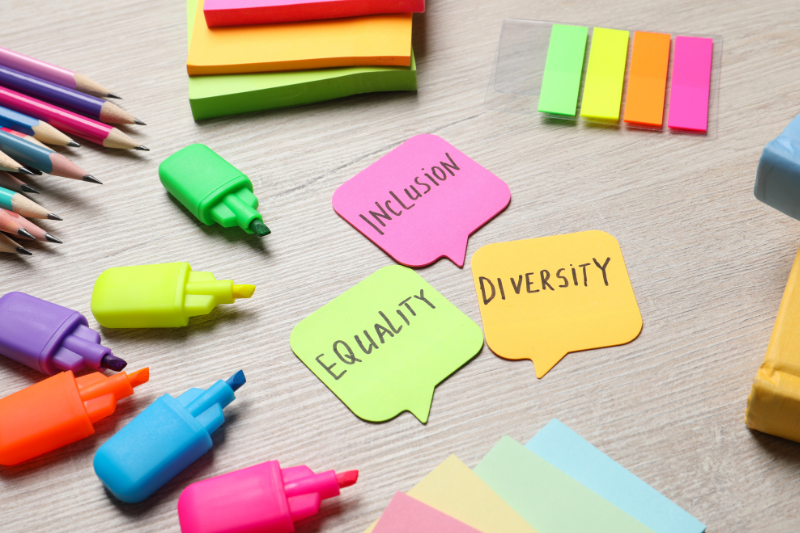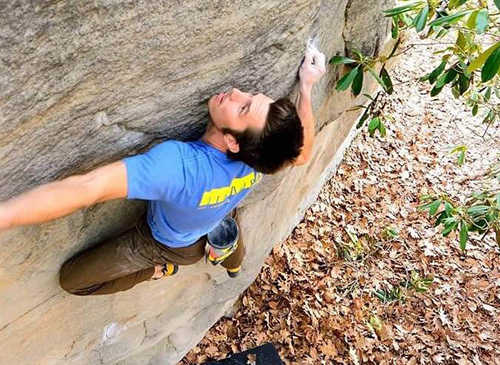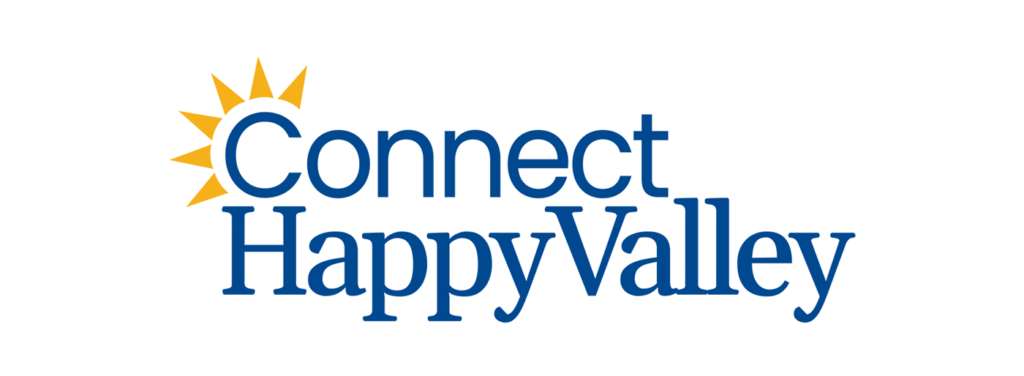By Holly Riddle

Diversity, equity and inclusion (DEI) efforts have received substantial attention over the last several years, both within and beyond the confines of private industry. According to McKinsey & Company, in 2020, the global DEI market was expected to more than double by 2026.
All of these nationwide trends are reflected on a smaller scale in Happy Valley.
More companies and organizations are realizing that DEI efforts are just good business. Harvard Business Review found that the higher an organization ranked for its DEI efforts, the higher its change power score (a measure of how well an organization can adapt, weathering evolving industries and global landscapes for higher profits, greater employee engagement and other benefits). According to Harvard Business Review, in a study of nearly 80 large companies, “every 0.1-point improvement in DEI ratings for a company (on a 5-point scale) was linked to a corresponding 13% increase in the absolute change-power score on average.” A similar Harvard Business Review study found that more diverse venture capital firms were markedly more profitable.
Additionally, for those looking to attract and retain new talent, DEI is key. It’s something that HappyValley Industry has already addressed in past coverage on attracting and retaining new talent, and it’s something that studies continue to prove.
While more attention is on DEI, there’s still substantial work to be done. The same McKinsey report above noted that, at the current rate, it will take more than 150 years to close the global economic gender gap. A recent study found that less than a third of surveyed employees reported their employers had taken any action to demonstrate their commitment to DEI in the last six months. Pew Research found that only about half of surveyed respondents said they have training or meetings on DEI at work, with a third or less reporting on-staff DEI support and DEI-related benefits in the workplace, such as salary transparency or identity-related resource groups.
All of these nationwide trends are reflected on a smaller scale in Happy Valley.
New roles, new focus
We spoke with a range of individuals throughout Centre County who are either in DEI roles or who are involved in organizations related to promoting diversity and inclusion within the community. Most all agreed that, for the large part, Happy Valley is making strides toward making the area a truly diverse and inclusive place to live and work, with those who have lived in the area for decades noting significant changes.
Additionally, some organizations around the region are making a big push for DEI in new ways, with new roles created to oversee such initiatives.
It’s my job to…pass the microphone to marginalized individuals so they can tell us what we need [to do]
At the State College Area School District, the role of director of equity, inclusivity and belonging is a relatively new one, created about five years ago. Tonya Black stepped into the role most recently, in 2022.
“The purpose of [the role] is for everyone within our school community — students, families, faculty, staff, administrators — to have an equitable and positive experience as we educate and support students,” she said.
As an example of what her role entails, she pointed to recruitment and retention efforts.
She explained, “We’re actively recruiting folks from diverse backgrounds, knowing that it’s beneficial not just for people of color, but for all people to experience and engage with a variety of people… I liaise with equity directors from across the state and we help each other with ideas, hiring and recruiting — hiring high-quality teachers in general, because we have a shortage of people going into education, let alone people from diverse backgrounds.”
Very similarly, the State College Borough recently created a role addressing DEI throughout both the borough departments as well as throughout the community at large. Chiluvya Zulu took over the role of director of diversity, equity, inclusion and belonging in 2022. It’s a role that, she said, the community demanded following the police shooting of Osaze Osagie.
“My philosophy on DEI work is that it is not my job to hold the microphone and talk about everything that can be encompassed in the words ‘diversity, equity and inclusion’,” she explained. “It’s my job to…pass the microphone to marginalized individuals so they can tell us what we need [to do].”
In addition to supporting community initiatives for events such as Pride and Juneteenth, Zulu also works with internal borough employees to provide training and education, acts as a DEI resource for the community in general, and provides transparency to the community regarding the police department’s internal affair investigations, among other tasks.
Changes over the years
Black has lived in the area for multiple decades and said she’s seen the growth and change within the community, even in small things, like increasing access to health and beauty products for people of color, something that might not have been available in the early 1990s.
“[Happy Valley] is a place that acknowledges the challenges that occur…We’re working very hard and actively to make sure people know they can connect and we can work together to meet needs, should any problems arise,” she said.
Another individual who’s seen Happy Valley’s long-term growth is Carol Eicher, co-founder of the Community Diversity Group, a nonprofit incorporated in 2003. The organization’s original mission was to help businesses diversify their workforces.
She explained, “There were a lot of people in the community from diverse backgrounds who were connected to the university, but not necessarily here to work and live in our community. We had a lot of students who were of diverse backgrounds, but they left when they graduated.”
The organization found this original mission a bit harder than expected, and ended up evolving their mission statement to take a community, rather than a business, focus. Eicher said that, in the early 2000s, while the community could provide educations and jobs for a diverse population, it wasn’t, at least at that time, providing the basic amenities a more diverse population might want and need, whether that be products at the grocery store, restaurants or entertainment. As such, many looked to larger, nearby cities to meet their needs.
Over the last two decades, though, she said the community has changed and, as the population and diversity have increased, those amenities have become available in ways they weren’t even just 10 years ago.
Room to grow
Multiple interviewees, when asked about inclusion and diversity in the region, referenced a tendency to think of all things as well and good in Happy Valley — “happy” is right in the name, after all. However, this ties into one of the areas for potential growth that many mentioned as well: a lack of awareness. Community members can’t fix what they don’t know is broken.
Zulu said, “I think that State College has always tried to be very equitable and inclusive. I think having [Penn State] here really helps with that…[However] I do think there were some things and people that were an afterthought or were being missed in the conversation.”
Because of this, multiple organizations throughout the community have arisen to spread awareness, create connections and shine light on underserved populations and issues.
One such organization is the Community & Campus in Unity (CCU) organization founded in the mid-2010s in response to police brutality protests.
“The whole purpose,” said Terry Watson, chair of the organization as well as the assistant director of academic advising and student disability services at Penn State World Campus, “was to get folks together, have these discussions, talk about what it meant to our community and focus on how we can make sure our community is more inclusive, specifically to people of color.”
Since its founding, the organization has evolved to work with local municipalities and small businesses, as well as help address issues that involve policing, though Watson did mention that the organization is still working to increase transparency in this area.
“We have a community that, overall, is dedicated to making it inclusive. The downside, though, is that there are folks who are unaware of some of the hot-button issues,” he added. “One of the things about being a chair for CCU is that we hear about incidents that impact our community, either on a micro or macro level. [Those incidents] set us back.”
Center for Alternatives in Community Justice has worked in the community for more than 30 years, providing restorative justice-centered services for youth who enter the judicial system and those released on bail, as well as multiple mediation services. Director Phil Jones mentioned that, as far as diversity and inclusion go, Happy Valley has “room to grow,” and, as such, the Center launched its community conversations series that brings community members together for discussions on related topics.
He said, “We learned through that [series] that there’s a broad understanding that people that are impacted by a lack of diversity do have a voice. Maybe because we’re in a university town and have a highly educated community, there’s some awareness and understanding. However, in all reality, we have a long way to go regarding diversity.”
Getting involved
For those interested in learning more about the region’s DEI resources, there’s no shortage of opportunities.
At the State College Borough, Zulu can help point business leaders in the direction of the right resources for their individual needs.
Information about the Center for Alternatives in Community Justice community conversations series can be found at https://cacj.us/home. Jones also mentioned that the Center is looking for volunteers, both for its board and its youth aid panel, with more information available at cacj.us/volunteer.
For parents relocating to the area and enrolling their children in a SCASD school, Black encourages them to reach out with questions so she and the DEI team can get to know them and be as helpful as possible.
Regardless of your reasons for exploring Happy Valley’s DEI resources, Zulu cautions business leaders in particular to not “just do it to do it.” She clarified that DEI professionals need leadership support and buy-in to truly make an impact.
What’s your opinion on the state of diversity, inclusion and equity in Happy Valley? Let us know at sophia@affinityconnection.com.






